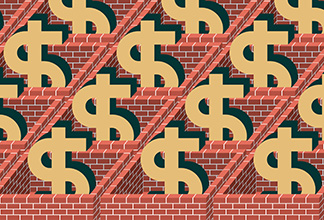On Our Minds: My 5 Stages of Market Volatility
Written by Rita Silvan | Published on January 26, 2021
Written by Rita Silvan | Published on January 26, 2021
Raise your hand if you think you'll ever forget March 2020. Me neither. Last year, I experienced in full what I had previously experienced in part: Volatility is to a portfolio what wind is to a sailboat – you need it to launch, but it can also cause choppy waters and could put you at risk of being thrown against the rocks.
As the destructive storm that is COVID-19 rattled the markets, my emotions bounced along with them. At first, I was in denial. Next came anger. After that was bargaining, swiftly followed by a deep sadness that felt like depression. Now, I would very cautiously say that I have accepted our reality.
Sound familiar? Some have said the pandemic has provoked in us a grief of sorts, so it's no surprise that I experienced all of the emotions that psychiatrist Elisabeth Kübler-Ross famously linked to grief in her 1969 book On Death and Dying. Similarly, I wouldn't be surprised if I wasn't alone on my emotional roller coaster last year.
Here's what being an investor through early 2020 looked like for me. My guess is some of you may relate.
Early March: Denial
Last year started well with the markets continuing to rise. Still, I kept a wary eye out for October. After all, October is associated with some of the most dramatic stock market crashes, like those in 1929 and 1987, and many market watchers already thought the bull market was winding down.
I really should have dusted off my copy of William Shakespeare's Julius Caesar, in which the soothsayer warns: "Beware the Ides of March." On March 11, the World Health Organization declares a global pandemic. On March 16, the S&P 500 drops nearly 12 per cent, posting its worst day since October 1987. (On this day and three others in March, the index plunges low enough to trigger market-wide circuit breakers, halting trading for 15 minutes. The markets hadn't seen a circuit breaker since 1997.)
Yikes! Normally I check my portfolio several times a day (I know it's not recommended, but I do it anyway). I can't stomach the sea of red on my holdings page, so I stop looking. As the joke goes, "Denial is not just a river in Egypt."
Late March: Anger
Over the past 11 years of the bull market, from time to time, I was tempted to take some profits to raise cash for future buying and to build up an emergency fund. But did I do it? No. Why? Greed. Now I'm steamed — with myself. It's hard to believe that just a month ago, I was worried about having to pay capital gains tax later in the year. Well, the markets seem to have solved that problem.
Early April: Bargaining
"Dear Market Gods," I recite in my head, "I promise to behave more rationally from now on by rebalancing regularly. All I ask is that you make my portfolio whole again." Are they listening? Central banks issue an S.O.S. ("Save Our Stockmarket") with monetary stimulus and interest rates near zero. The S&P 500 is on its way to recovery led by the high-tech titans. Overall, my portfolio is holding steady. (Do I rebalance? No.)
Early May: Depression
Nothing makes sense. Globally, COVID-19 cases are still going up. Businesses are shuttering. People are out of work. There's no vaccine. And, yet…the markets keep going up – the S&P 500 has recovered two-thirds of its losses. Maybe it's true that the old rules no longer apply. But what are the new rules? I feel incapable of making the right decisions. I'm going back to bed. Wake me up in 2023.
Fast Forward to...Present: Acceptance
When I think back to what happened this past March, I'm reminded of the adage: Markets take the stairs up and the elevator down – except last year, to everyone's surprise, markets took the elevator down and then took the elevator back up. My portfolio was slightly up for the year. I'm heartened by a study by RBC Global Asset Management which tabulated median market reactions through dozens of crisis events going back to the Second World War. Whether the crisis was a disaster, an act of war, an economic policy shock or a global health scare, markets initially wobbled but mostly returned to positive territory within three months to a year. And, within three to five years, all markets showed very healthy returns. Let's hope for the same this time around.
I'm hoping to watch the next big wave, if and when it comes, from a distance – rather than find myself in its throes. To that end, I've sold some holdings and parked the proceeds in short-term cash. But more than anything, looking ahead, I'll remember to revisit expectations. After all, markets move in their time, not mine.
On Our Minds is a regular feature written by RBC Direct Investing's Inspired Investor content team.
RBC Direct Investing Inc. and Royal Bank of Canada are separate corporate entities which are affiliated. RBC Direct Investing Inc. is a wholly owned subsidiary of Royal Bank of Canada and is a Member of the Canadian Investment Regulatory Organization and the Canadian Investor Protection Fund. Royal Bank of Canada and certain of its issuers are related to RBC Direct Investing Inc. RBC Direct Investing Inc. does not provide investment advice or recommendations regarding the purchase or sale of any securities. Investors are responsible for their own investment decisions. RBC Direct Investing is a business name used by RBC Direct Investing Inc. ® / ™ Trademark(s) of Royal Bank of Canada. RBC and Royal Bank are registered trademarks of Royal Bank of Canada. Used under licence.
© Royal Bank of Canada 2024.
Any information, opinions or views provided in this document, including hyperlinks to the RBC Direct Investing Inc. website or the websites of its affiliates or third parties, are for your general information only, and are not intended to provide legal, investment, financial, accounting, tax or other professional advice. While information presented is believed to be factual and current, its accuracy is not guaranteed and it should not be regarded as a complete analysis of the subjects discussed. All expressions of opinion reflect the judgment of the author(s) as of the date of publication and are subject to change. No endorsement of any third parties or their advice, opinions, information, products or services is expressly given or implied by RBC Direct Investing Inc. or its affiliates. You should consult with your advisor before taking any action based upon the information contained in this document.
Furthermore, the products, services and securities referred to in this publication are only available in Canada and other jurisdictions where they may be legally offered for sale. Information available on the RBC Direct Investing website is intended for access by residents of Canada only, and should not be accessed from any jurisdiction outside Canada.

Dates, deadlines, announcements and more that self-directed investors need to know.

Explore RBC Direct Investing’s improved Trading Dashboard with a simple and intuitive Default view.

This year’s budget went off without much fanfare, save for one thing: capital gains taxes are heading higher.